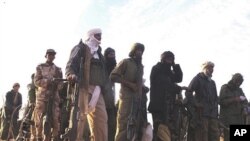As Mali inches its way back to legitimate government just weeks after a military coup, a complex web of Islamist extremists and Tuareg separatists controls the north. Analysts say the situation, while alarming, is not all that different from how things stood at the start of 2012 and, while still in flux, is unlikely to change dramatically in coming months.
French media is reporting that dozens of members of the Nigerian sect Boko Haram now are part of a motley crew of Islamic militants in northern Mali, specifically in the city of Gao.
Local radio director Isa Idrissa Maiga said from Gao that he has seen a diverse group of militants including Algerians, Malians and Nigerians. He has heard them speaking Arabic, English, Hausa and other languages. He says some are dressed like northern Nigerians, and people say they are Boko Haram. However, he says they have seen Nigerian militants coming to train in northern Mali for some time.
Bamako has lost control of a vast triangle of desert in the north that is larger than France. However, the area has long been the lawless playground of traffickers, kidnappers and local jihadist franchise Al-Qaida of the Islamic Maghreb, or AQIM, which has its roots in an Algerian Salafist movement.
Director of the Washington-based Michael S. Ansari Africa Center, J. Peter Pham, says the presence of Boko Haram is not impossible, but it is unlikely.
"AQIM has always had a few Nigerians in it," said Pham. "Also, the splinter group, the Movement for Oneness and Jihad in West Africa, certainly has largely sub-Saharan African membership so they might be associated with them. They might be Boko Haram trainees who are with AQIM."
Experts say that Boko Haram has links to al-Qaida's Africa franchises but appears focused on attacks within Nigeria where it wants to install Islamic law.
The Movement for Oneness and Jihad in West Africa is a relatively new offshoot of AQIM. It claimed responsibility for kidnapping seven Algerian nationals from that country's consulate in Gao in early April.
Gao is one of three northern regional capitals captured by Tuareg separatists and the radicalized Tuareg group Ansar Dine in late March.
It appears Ansar Dine has since pushed independence fighters aside and been joined by fellow Islamists. The convergence has sparked fears of a terrorist state in the Sahel, or perhaps a stronger terrorist foothold in the region.
However, Pham says the only major difference is the capturing of the three capitals.
"This really just puts it in stark relief what really has been the situation for a number of months," he said. "The Malian government has effectively not controlled the north. AQIM, Ansar Dine and the others, they didn't gain much strategically that they didn't have before. They operated freely in the countryside, but now they have the burden of having to administer these cities with their discontented populations."
Ansar Dine has begun trying to impose its version of sharia in the captured cities. Bars are reportedly closed, women veiled and thieves in danger of having their hands cut off.
Political science professor Ricardo Laremont of Binghamton University, in the northeastern U.S. state of New York, says Mali has never known this type of Islam, unlike for example, northern Nigeria where sharia was widely practiced in previous centuries.
"Today, as we speak, the people who have the guns and can impose order are AQIM and Ansar Dine," said Laremont. "They have control of the situation today. The question is whether what they have accomplished is a pyrrhic victory. Will they be able to govern heterogeneous societies? I'm not so sure."
Still, experts say the de facto division of the country is unlikely to change in coming months, though the situation will remain fluid as Tuareg rebels and Islamist militants continue to jockey for dominance.
Mali has vowed to receiver the lost territory, though its military had already proven ill-equipped against the rebels even before the chaos of the coup.
Regional bloc ECOWAS has pledged its support and is currently reviewing plans for a military intervention.
However, experts say putting together the proposed 2,000-troop ECOWAS force could take months.
News
De-facto Division of Mali Likely to Remain in Short-Term
- By Anne Look




